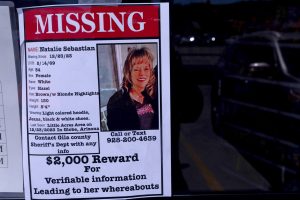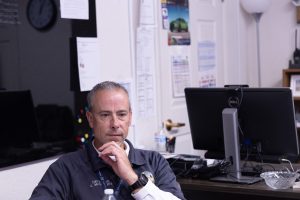- Slug: BC-CNS-Missing Person Collaboration. 670 words.
- 3 photos available (thumbnails, captions below).
By Marnie Jordan
Cronkite News
GLOBE – Founded in 1876, this old mining town is at the foot of the Pinal Mountains in southern Gila County. As visitors walk the streets of historic downtown Globe, they’ll see cafes, shops and old buildings.
Globe had only about 7,200 residents in 2022, according to the Census Bureau. Here, neighbors know neighbors, which is why when Natalie Jo Sebastian disappeared, word got around quickly.
“People know everybody’s business … it’s very closely knit where people know people,” said Gila County Sheriff’s Office Detective Christopher McGroarty. “The awareness of Natalie being missing in Globe is well saturated.”
McGroarty started working on Sebastian’s case at the beginning of January and in Globe, every bit of help is appreciated, including help from private investigators. McGroarty appreciates every lead, no matter the source.
“I think the private investigator is beneficial. Again this individual can – just for an example – perhaps can spend a whole day on this, whereas I really don’t have a lot of time to do that on one case,” McGroarty said.
The private investigator he is talking about is Larry Rives. He was hired to help in the case by Sebastian’s husband, Jerry, who said his wife’s disappearance has been stressful and has turned his world upside down.
Rives, who has owned Agency NW Investigations for about 15 years, and spent 32 years in law enforcement before that, said he covers areas in the case that McGroarty doesn’t have time to cover, explaining he isn’t bound by certain hours or other job responsibilities.
McGroarty is a 16-year veteran at the sheriff’s office, which he said has between 40 to 50 sworn deputies in different roles. McGroarty works out of a small substation just outside of downtown Globe. Most investigators are working on multiple open cases.
The sheriff’s office said Sebastian, 54, went missing on Dec. 23. Sebastian reportedly left her home at approximately 4:05 a.m. on foot with no personal belongings besides her driver’s license and has not been seen or heard from since.
McGroarty said Sebastian was placed into national and state databases, which allow law enforcement to identify her as a missing person and gives them a wider reach.
“For example, if she’s contacted in Georgia or Florida, that communication will still get back to us. It’s a priceless system, it’s absolutely valuable,” McGroarty said.
In addition to databases, McGroarty said he uses traditional investigative techniques, such as interviews and search warrants.
McGroarty said he drafted a search warrant for Natalie’s home phone records, which would be useful to provide potential leads. However, during the investigative process, he said he ran into problems obtaining phone records due to privacy issues.
“Why do they have to make it so difficult for us in investigations to even get our warrant pushed through, let alone receive the data that we’re asking for?” McGroarty said. “It’s unnecessary. It’s absolutely unnecessary.”
And every roadblock can make a difference in an open case, especially in a small office.
McGroarty said law enforcement resources and officers are stretched thin in the department and his caseload can become overwhelming.
“I think at this point any additional resource that we can throw at this content would be useful,” McGroarty said, noting he’s open to help from private investigators.
Rives said he follows up on leads, tracks people down and interviews them.
“I have sources that are helping provide me with information that law enforcement probably wouldn’t get based on my background in criminal defense work,” Rives said, noting he supplements detectives’ work.
“I coordinate everything through Chris. Anything I do I send Chris an update on what I’m doing so that we’re all on the same sheet of music and we’re not duplicating each other’s work, because neither one of us has time to do that” Rives said.
McGroarty said his current sergeant also ensures older cases are being assigned and investigated.
“We don’t want things to go unnoticed. We don’t want victims of crimes and families to suffer with no explanation or resolve whatsoever,” McGroarty said.


